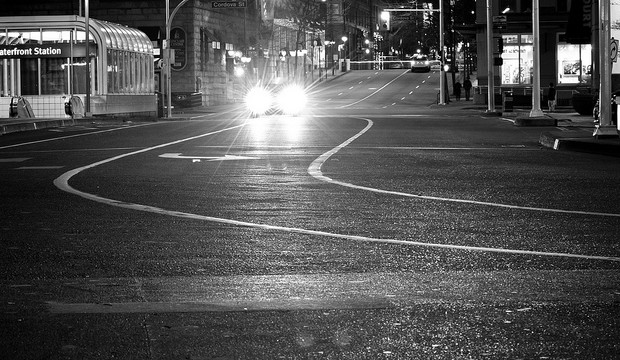And the courts said, “Let there be light!”
Flashing your headlights to warn other drivers of speed traps is speech protected under the First Amendment.
This article is the second in a three-part series on citizens’ rights when interacting with police. You can read Part One here.
Courts across the country have held that flashing headlights to warn other drivers of speed traps ahead is a form of speech protected by the First Amendment and therefore, cannot be the sole basis for police to pull over a driver.
The First Amendment to the United States Constitution enumerates five of our most basic rights, including the freedom of speech. Speech may be either written or spoken words, as well as expressive conduct.
Lake Mary, Florida resident Ryan Kintner inadvertently brought national attention to a common issue that many drivers have faced over the years. In August 2012, Kintner was ticketed by a Seminole County deputy for violating a state traffic law defining the appropriate use of car headlights. The deputy told Kintner that he violated the law by flashing his headlights to warn other drivers of a speed trap ahead.
Rather than simply going to court and paying the fine, Kintner decided to fight the unjust law by suing the Seminole County Sheriff’s Office. Circuit Judge Alan Dickey ruled that not only was there no violation of state law, but Kintner was also protected by his First Amendment right to free speech. As Judge Dickey explained, “If the goal of the traffic law is to promote safety and not to raise revenue, then why wouldn’t we want everyone who sees a law enforcement officer with a radar gun in his hand, blinking his lights to slow down all those other cars?”
More recently, in April 2014 an Oregon judge dismissed a citation issued to Chris Hill, a truck driver who flashed his headlights to warn a fellow driver of nearby law enforcement. Acting as his own attorney, Hill raised a free speech argument. Jackson County Justice Court Judge Joseph Carter agreed that the citation was “clearly given” to punish Hill for his expression. He stated that while the government should enforce traffic laws to ensure the safety of the public, it cannot do so simply to “punish drivers for their expressive conduct.”
Hill based his argument on a February 2014 case that was decided in the U.S. District Court for the Eastern District of Missouri. In November 2012, Michael Elli was cited by an Ellisville police officer for flashing his headlights to warn other drivers of a radar trap, an offense for which he could have faced a $1,000 fine. Although the city dropped the charges, the American Civil Liberties Union (“ACLU”) filed suit to stop the practice. In an eight-page opinion, Judge Henry E. Autrey ruled that drivers have a First Amendment right to flash their headlights to warn other drivers of nearby police or speed traps.
ACLU attorney Tony Rothert compared this example of expressive conduct to a person at a gas station telling someone, “Hey be careful over there, there’s a speed trap.” Such a statement is protected speech and is not punishable. Flashing headlights, he explained, is no different.
As stated by the U.S. Supreme Court in Spence v. Washington, where there is intent to convey a “particularized message” that recipients are likely to understand, the speech is protected. “Irreparable injury” arises when a person loses his or her First Amendment freedoms, even for a minimal period of time.
Similar to the videotaping of law enforcement officers, unless there is an illegal interference with police investigations or an immediate danger to public safety, health, or welfare, a person flashing his or her headlights does not violate any laws.






